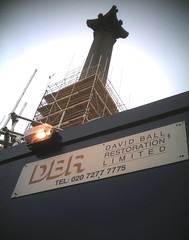THE Federal Opposition has long accused the Howard Government of playing dog-whistle politics -- sending subtle messages to the electorate which register with those eager to hear and respond to their calls.
Sending troops to board the Tampa and block the entry of its cargo of illegal entrants in August 2001 -- two months before the November election -- was just such a dog whistle moment, the government's vociferous critics claim.
If there was the whisper of a whistle at work then, how should the Opposition's current calls on nuclear energy and Indonesia be described? Bugles, trumpets or air raid sirens?

Opposition Leader Kim Beazley's attacks on the Government for its handling of the delicate relationship with our nearest neighbour, Indonesia, the world's largest Muslim nation, have revealed a new populist streak which rivals anything Pauline Hanson may have said.
ReplyDeleteThe commentariat has been more than happy to go along, accusing the Government of kowtowing to Indonesia.
The hypocrisy is stunning. Just a decade ago, former Prime Minister Paul Keating was boasting his successor John Howard would fall at the first hurdle when he tried to set up a relationship with Jakarta.
The opposite has occurred. Not only have Howard and Foreign Minister Alexander Downer built a relationship with Indonesia that surpasses all previous associations, it has ushered in a hitherto impossible degree of co-operation between the two governments which has seen Indonesia assist in blocking shipments of illegal entrants and has permitted Australian Federal Police to work with their Indonesian counterparts in tracking down and destroying terrorist networks on Indonesian territory.
The benefits of continuing this relationship are obvious to all except those in the ALP who put their petty political aspirations ahead of national security.
Deputy Opposition Leader Jenny Macklin's workout with the dog whistle on nuclear issues would put a bull elephant to shame.
Macklin has found a pliant media open to her bellowing and willing to run the sort of nuclear scare campaign which could have brought the Cold War to boiling point.
Mischievously, she has made a series of accusations about incidents at the Lucas Heights nuclear facility which bear little relation to the scope or magnitude and, too frequently, the press has not checked the facts before publishing her overblown claims.
In the past week, headlines have ranged from "Safety scare for nuclear workforce" to "Radioactive gas leak -- Lucas Heights worker contaminated in pipe rupture" but, before donning safety suits, it is worth looking at the facts and determining who actually poses the greater threat to public safety, Lucas Heights or Macklin.
With her insinuations and accusations, she is not dissimilar to the menace who dangerously encourages panic by calling "fire" in a crowded cinema.
Her exaggerated concern about the few incidents at Lucas Heights is ludicrous as not one has been of the level necessary to be reported to the regulator, the Australian Radiation Protection and Nuclear Safety Authority (ARPANSA). Not one.
The terms of the Act and the licences issued by ARPANSA require details of any significance -- the exposure of a worker beyond regulatory limits -- to be provided in 24 hours.
Other less significant events are reported to ARPANSA during routine quarterly reporting.
There were three incidents in the past week in addition to a pipe rupture the previous week, which released very low levels of radioactive gas (common in radiopharmaceutical production), which again were not reportable to ARPANSA.
Each was of a minor nature and there are no continuing concerns for the health of the workers. Not one of the incidents occurred in the reactor but in places well removed from its vicinity.
According to ANSTO, in the first of the three incidents on June 14, a worker received a low radiation dose of iodine-123, used in the diagnosis of thyroid cancer, while packaging the product for patient use.
He received 4 per cent of the annual limit for radiation workers and significantly less than a patient would in a nuclear medicine scan. He did not need any treatment and continued to work.
In the next incident, a worker's trousers and shoes were contaminated on June 15 when he dropped a vial with a small amount of technetium-99m.
His skin was not contaminated and his clothing was cleaned. He did not receive radiation above that associated with normal work.
The day after, a worker at the National Medical Cyclotron in Camperdown was cleaning up waste in a thallium-201 production area when a pack of radioactive material burst.
A small splash found its way beneath his safety glasses and into his eye. He had his eye washed at Royal Prince Alfred Hospital next door.
He received less than 1 per cent of the annual radiation dose for an eye, but as chemicals were involved, he was also seen by an eye specialist.
For all Macklin's blustering, such incidents would not normally be reported outside
ANSTO because the dose levels were significantly less than the reportable amount and there were no releases of radioactivity outside the laboratories.
But she is blowing the dog whistle for all she is worth because of the need for Labor to corral the green, anti-nuclear, anti-development vote.
She and her leader may well be whistling in the wind as most Australians can see co-operation with Indonesia dealt blows to terrorist groups and halted the refugee flow, and they know the benefits of nuclear medicine.
The whistle should have been blown on these deceivers sooner.
akermanp@dailytelegraph.com.au